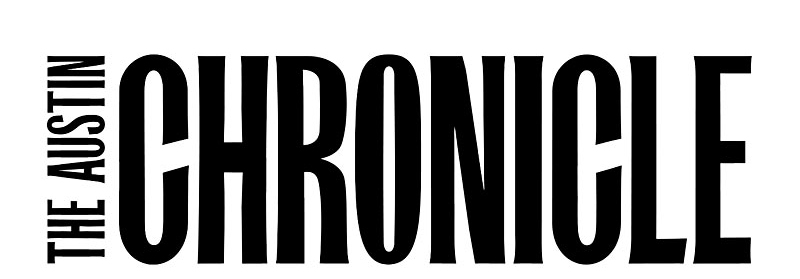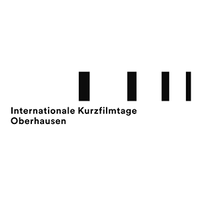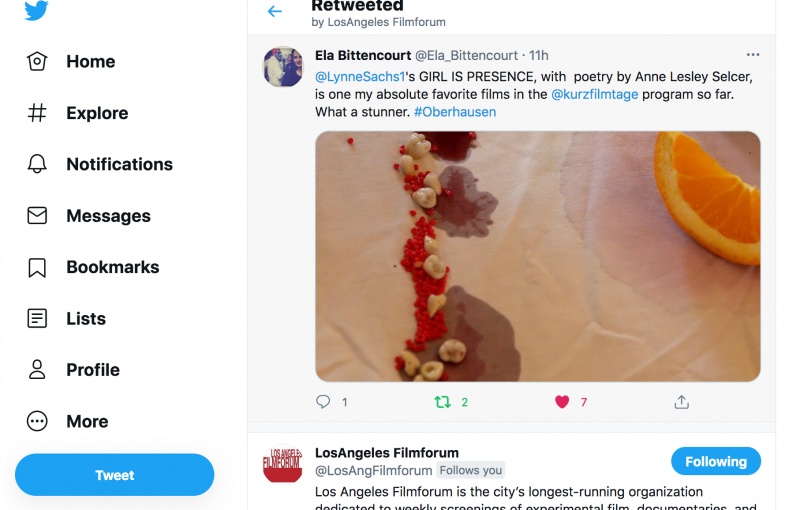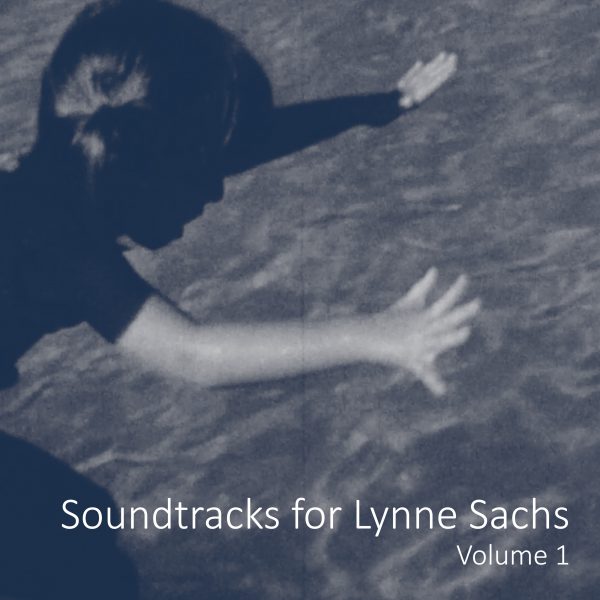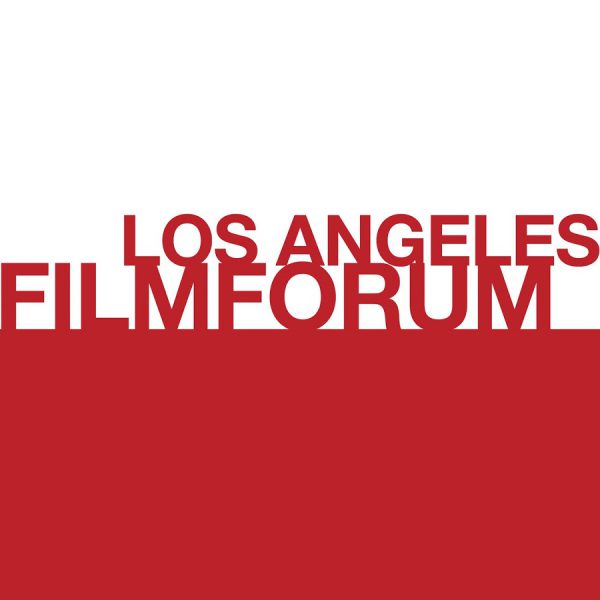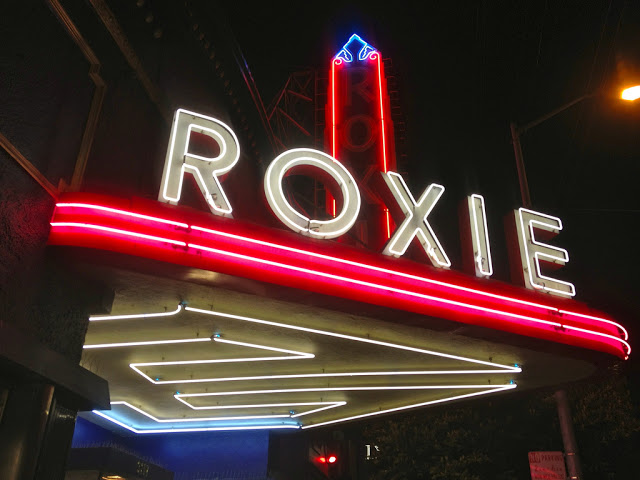Women in Experiment: Carolee Schneemann and Barbara Hammer
02/15/2021
Rosendale, NY
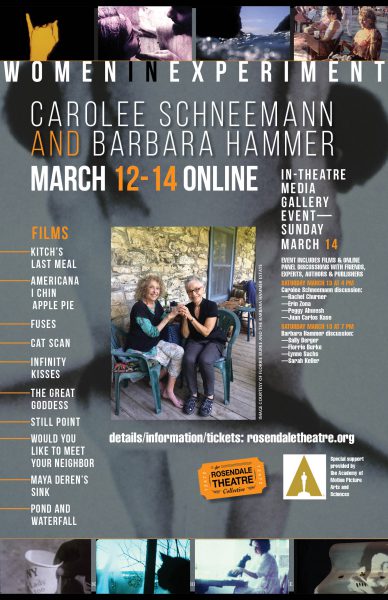
The Rosendale Theatre is excited to offer the program Women in Experiment: Carolee Schneemann and Barbara Hammer from March 12-14. March is Women’s History Month in the U.S., and International Women’s Day is observed across the planet on March 8.
Carolee Schneemann and Barbara Hammer are both major American filmmakers who have influenced visual and filmic arts in several wide spheres. Carolee Schneemann was known for her multi-media works (film, performance, installation, painting) on the body, narrative, sexuality and gender. Barbara Hammer, feminist filmmaker and pioneer of queer cinema, made over 90 moving image works as well as performances, installations, photographs, collages and drawings.
Both filmmakers were friends and mutual admirers, born in the same year and died within 10 days of one another. Their connections to our local area (including the Women’s Studio Workshop, the Woodstock Film Festival, and the Rosendale Theatre) are maybe more poignant for us locally, but their international reach as artists and mavericks speaks freedom and creativity out loud and in all languages.
WOMEN IN EXPERIMENT: CAROLEE SCHNEEMANN AND BARBARA HAMMER
THE PROGRAM SCHEDULE:
March 12-14 with SELECT FILMS AVAILABLE until March 16.
Saturday, March 13: TWO PANEL DISCUSSIONS through the Rosendale Theatre Live streaming.
- Carolee Schneemann Panel Discussion, live at 4 pm EST on March 13
- Barbara Hammer Panel Discussion, live at 7 pm EST on March 13
Sunday March 14 | 2 – 6 PM | $10
In-Theatre Media Gallery & Short Films AT THE THEATRE
Rosendale Theatre’s walk-through media gallery. Timed entry tickets available: Pond and Waterfall (1982), Lesbian Whale (2015) (Barbara Hammer); Plumb Line (1968-71), Vulva’s School (1995) (Carolee Schneemann)
Safety Protocols for In-Theatre Event:
- Capacity is limited
- Timed entries into program
- Temperatures taken at door
- Masks must be worn
- Social distancing enforced
ONLINE FILMS PACKAGE or Individual Films Available:
Full Package: (good from March 12-14) $30 or $5 each movie.
- Fuses(Carolee Schneemann; 1964-67, 29:37, color silent)
- Kitch’s Last Meal(Carolee Schneemann; 1973-76, 54:11, color, sound)
- The Great Goddess(Barbara Hammer; 1977, 22:16 b&w sound)
- Would You Like to Meet Your Neighbor: A NY Subway Tape(Hammer, 1985, 12:39, color sound)
- Snow Job: The Media Hysteria of AIDS(Barbara Hammer; 1986, 7:42, color sound)
- Catscan(Schneemann; 1988, 12:46, color sound)
- Still Point(Barbara Hammer; 1989, 9:14, color sound)
- Americana I Ching Apple Pie(Schneemann; 2007, 16:37, color sound)
- Infinity Kisses(Schneemann: 2008, 9:18, color sound)
- Maya Deren’s Sink (Hammer; 2011, 29:08, color sound)
Stand Alone Movie: (good from March 12-16)
- Welcome to This House( Barbara Hammer; 2015; 78:54, color sound) $12
- Fuses & Infinity Kisses
- Part of the full package above, March 12-14.
- Stand alone, March 15-16, both movies for $12.
- A Month of Single Frames (for Barbara Hammer) (Lynne Sachs; 2019, 14 min) (available to U.S. audiences only) $5
- CLICK HERE to preorder tickets or watch when available.
ABOUT THE FILMMAKERS:
Carolee Schneemann October 12, 1939 – March 6, 2019
Carolee Schneemann was born in Pennsylvania, and received a BA in poetry and philosophy from Bard College and MFA from the U of Illinois. She was based locally, living at the line between New Paltz and Rosendale, in an 18th century Huguenot farmhouse, about 3 miles from the Rosendale Theatre.
“Carolee Schneemann is one of the most important artists of the postwar period. Her work in a range of media—painting, film, video, dance and performance, constructions and installations, the written word, and assemblage—presents an unparalleled catalogue of radical aesthetic experimentation.” —notes on the publication Carolee Schneemann Unforgivable
investigations into gender and, in her own words, “forbidden aspects of the female experience” laid the groundwork for much feminist art of the 1980s and 90s.
“Prior to Schneemann, the female body in art was mute and functioned almost exclusively as a mirror of masculine desire.” — Jan Avgikos, Artforum
“Carolee Schneemann was a visionary. She challenged taboos and was undaunted by censorship, including cancelled screenings of her 1967 film Fuses, bans on imagery documenting her 1975 performance Interior Scroll, and attacks on her later political work… Her language is the visceral, yet intensely political, language of the body, of gesture, of sensuality and eroticism. Even today, she remains radical.” — Joy Garnett, National Coalition Against Censorship
“A feminist visionary and one of the most influential artists of the late 20th century.” _The New York Times
Her work has been exhibited around the world, she has received numerous international awards, and she published several books and taught at many institutions.
Barbara Hammer, May 15, 1939 – March 16, 2019
In the early 1970s Hammer studied film at San Francisco State University. After seeing Maya Deren’s film Meshes of the Afternoon, she was inspired to make experimental films about her personal life. After coming out as a lesbian she “took off on a motorcycle with a super-8 camera” and in 1974 filmed Dyketactics, widely considered to be one of the first lesbian films.
Hammer sought to deconstruct and disempower the narratives and structures that oppress women in general and lesbians in particular. From her earliest experimental work, her films are playfully and relentlessly challenging of accepted norms and taboos.
In Barbara’s words, “As a visual artist who primarily uses film and video in experimental, nonlinear time based work, my practice includes performance, installation and digital photography. I embrace critical and formal complexity while promoting an active and engaged audience. Thematically, my work deconstructs a cinema that often objectifies or limits women. My work makes these invisible bodies and histories visible. As a lesbian artist, I found little existing representation, so I put lesbian life on this blank screen, leaving a cultural record for future generations.”
Barbara received over 50 career awards and honors, and more in individual film awards and grants. Besides her extensive body film and video works, Barbara published several books and many articles.
“Hammer prefers the term ‘actionary’ to ‘visionary’ in describing the work of other queer artists she has documented and promoted over the decades. On the basis of this show, I’d say both terms apply to her.” – Holland Cotter, New York Times
“A testament to the singular combination of sincerity and irreverent humor that characterizes [Hammer’s] sex-positive feminism. . . . Hammer’s work reminds us that visibility is a political act.” – Artforum (review of Hammer’s book, Evidentiary Bodies)
“Barbara Hammer is a true cinematic pioneer; her tremendous body of work continues to inspire audiences and artists alike.” —Jenni Olson, LGBT film historian
Primarily based in New York City, Barbara spent time in the Hudson Valley/Catskills area. She exhibited at the Woodstock Film Festival, SUNY Ulster, and the Rosendale Theatre.
ABOUT THE FILMS:
Fuses(Carolee Schneemann; 1964-67, 29:37, color silent)
Schneemann’s self-shot erotic film remains a controversial classic. “The notorious masterpiece… a silent celebration in colour of heterosexual love making. The film unifies erotic energies within a domestic environment through cutting, superimposition and layering of abstract impressions scratched into the celluloid itself… Fuses succeeds perhaps more than any other film in objectifying the sexual streamings of the body’s mind” — The Guardian, London
Kitch’s Last Meal (Carolee Schneemann; 1973-76, 54:11, color, sound)
This film documents the routines of daily life while time passes, a relationship winds down, and death closes in.
The Great Goddess (Barbara Hammer; 1977, 22:16 b&w sound)
Would You Like to Meet Your Neighbor: A NY Subway Tape (Hammer, 1985, 12:39, color sound) Would You Like to Meet Your Neighbor? A New York City Subway Tape finds Barbara Hammer (wearing a mask made of subway maps) conducting gonzo interviews with subway riders, getting their thoughts on the city, their fellow passengers, and navigating public space.
Snow Job: The Media Hysteria of AIDS (Barbara Hammer; 1986, 7:42, color sound)
“I first heard of AIDS in 1985 when I was teaching at Columbia College in Chicago. I noticed the strange and inflammatory articles in the newspapers and I asked my students to collect hysteric headlines for me. And so I began my work on Snow Job: The Media Hysteria of AIDS. I examined the public ignorance, stigmatization, and just plain wrong attitudes towards this new illness. By making a snow storm of newspaper clippings I could show what a ‘snow job’ the media was making.” — Barbara Hammer
Catscan (Schneemann; 1988, 12:46, color sound)
Catscan is a group performance within a chaotic density of projected images and office furniture, motivated by Egyptian funerary rituals of mourning, grief and spirits of the dead. It sustains aspects of Schneemann’s previous works built with dream instruction, positing the interchange of intimacy and physicality, the erotic and the obscene, the incubation of dream enactment. Catscan centers on the death of a beloved cat as a means to ritualize more universal mourning and to bring forward ghosts of the past. As a ritual consecration, Schneemann, blindfolded, dances out of 20 yards of red fabric wound around her body.The performance, which had a duration of approximately 90 minutes and variously featured 5 to 8 performers, included a slide projection system, 15 video monitors, ladders, furniture, suitcases, and debris.
Still Point(Barbara Hammer; 1989, 9:14, color sound)
Still Point whirls around a point of centeredness as four screens of home and homelessness, travel and weather, architecture and sports signify the constant movement and haste of late twentieth century life. “At the still point of the turning world, that’s where the dance is,” wrote T.S. Eliot in “Burnt Norton,” the first poem of Four Quartets. Hammer seeks a point of quiet from which all else transiently moves.
Americana I Ching Apple Pie (Schneemann; 2007, 16:37, color sound)
Writes Schneemann: “The ‘Americana I Ching Apple Pie’ recipe was first enacted in my Belsize, London kitchen in 1972. Unfortunately, the original footage disappeared with the man doing the documentation who may have been working for the CIA. The next presentation was May ’77, as a cooking event for the Heresies Magazine performance and jumble sale benefit. With the exception of a dozen apples, flour, maple syrup, and eggs which I brought, all the cooking ‘material,’ utensils, and props were discovered in the jumble. Objects which functionally approximated actual cooking utensils were used: nails, hammers, an arrow, a flower pot, ball bearings, rags, a watering can. The cook’s apron was a ripped mini skirt with which I covered my hair. As I state in the performance, ‘traditionally you need an apron, but it doesn’t matter where you put it.’
Infinity Kisses (Schneemann: 2008, 9:18, color sound)
Infinity Kisses – The Movie completes Schneemann’s exploration of human and feline sensual communication. It incorporates extracts of the original 124 self-shot 35mm color slide photo sequence, Infinity Kisses, in which the expressive self-determination of the ardent cat was recorded over an eight-year period. Infinity Kisses – The Movie recomposes these images into a video, in which each dissolving frame is split between its full image and a hugely enlarged detail.
Maya Deren’s Sink(Hammer; 2011, 29:08, color sound)
Maya Deren’s Sink explores Deren’s concepts of space, time and form through visits and projections filmed in her Los Angeles and New York homes. The project began after Hammer discovered a sink formerly owned by Deren at Anthology Film Archives and embarked on an homage to the “Mother of American Experimental Cinema.”
Hammer re-imagines Deren’s film locations of the 1940s in the present, providing entry into intimate spaces and former times, reclaiming the places that inspired the influential filmmaker. Hammer interweaves the performance of an actor, as well as the voices of the current home owners, Judith Malina, Carolee Schneemann, Ross Lipmann and others. The meditation on space and architecture investigates the relationship between private and public spheres, creating a unique architectural portrait of Deren.
The experimental soundtrack is created from the music of Teiji Ito (Deren’s third husband), Tavia Ito, and Teiji’s daughter.
Welcome to This House (Barbara Hammer; 2015; 78:54, color sound)
Welcome to This House is a feature documentary film on the homes and loves of poet Elizabeth Bishop (1911-1979), about life in the shadows, and the anxiety of art making without full self-disclosure. Hammer filmed in Bishop’s ‘best loved homes’ in the US, Canada, and Brazil believing that buildings and landscapes bear cultural memories. Interviews with poets, friends, and scholars provide “missing documents” of numerous female lovers. Bishop’s intimate poetry is beautifully performed by Kathleen Chalfant and with the creative music composition by Joan La Barbara brings Bishop into our lives with new facts and unexpected details.
“As an artist I believe that the architectural structures in which I live and work influence the art I make. I went in search of Bishop’s homes to explore the buildings and the poetry and paintings she made in them. This quest took me to her childhood home in Nova Scotia, to Camp Chequesset on Cape Cod, to Vassar College where she went to school, and to her homes in Key West, Brazil, Cambridge and Boston.
“Bishop was in the closet to the outside world, but she seemed to have as many lovers as she had homes. I globe trotted on her trail and found more and more female lovers emerging from interviews with friends, colleagues, critics and poets. Bishop was a lusty woman and I respect that, but writing openly of these experiences wasn’t possible due to her need for privacy propelled by the homophobia of the times. In addition, and maybe partly responsible for her reticence, was the childhood trauma she experienced of her mother’s breakdown and confinement in an institution. The understanding of this significant loss following the death of her father when she was an infant, and her conflicted need both to stay still and to move brought me to a closer reading of published and unpublished poems where I found intimate disclosures in her poetry.” — Barbara Hammer
A Month of Single Frames (for Barbara Hammer) (Lynne Sachs; 2019, 14 min)
In 1998, filmmaker Barbara Hammer had a one-month artist residency in the C Scape Duneshack which is run by the Provincetown Community Compact in Cape Cod, Massachusetts. The shack had no running water or electricity. While there, she shot 16mm film with her Beaulieu camera, recorded sounds with her cassette recorder and kept a journal.
In 2018, Barbara began her own process of dying by revisiting her personal archive. She gave all of her Duneshack images, sounds and writing to filmmaker Lynne Sachs and invited her to make a film with the material.
“While editing the film, the words on the screen came to me in a dream. I was really trying to figure out a way to talk to the experience of solitude that Barbara had had, how to be there with her somehow through the time that we would all share together watching her and the film. My text is a confrontation with a somatic cinema that brings us all together in multiple spaces at once.” — Lynne Sachs
ABOUT THE PANELISTS
Saturday, March 13, 4:00 pm: Panel on Carolee Schneemann
Moderator: Rachel Churner, Director of the Carolee Schneemann Foundation. She is also an art critic, editor, and faculty member at Eugene Lang College at The New School. She owned and operated Churner and Churner, a contemporary art gallery in New York, from 2011 to 2015.
Peggy Ahwesh, Filmmaker. A true bricoleur, she has produced a broad range of works through the approaches of storytelling, improvisation, image appropriation and visual essay forms in an inquiry into cultural identity and the role of the female subject. Recent shows include: Queer Paranormal, Usdan Gallery, Bennington, VT; Private Lives, Public Spaces; MoMA; and Unsettled States, Center for New Media, Baruch College. Ahwesh is represented by Microscope Gallery, Brooklyn.
Dr. Juan Carlos Kase, Associate Professor of Film Studies at the University of North Carolina Wilmington. His research, which has been published in Discourse: Journal for Theoretical Studies in Media and Culture, Millennium Film Journal, The Moving Image, and OCTOBER, concerns the overlapping aesthetic, historical, and political registers of experimental cinema, documentary, art history, performance, and popular music within American subcultures.”
Erin Zona, Director Women’s Studio Workshop. Worked with Carolee before her death to republish Schneemann’s 1972 book: Parts of a Body House Book.
Parts of a Body House Book was originally published in 1972 by Beau Geste Press, which was run by Felipe Ehrenberg in Devon, England. This reprinting is a facsimile of Carolee’s personal copy from the first edition. Her intentions were to paint the back cover of each book and create a new set of hand interventions for the present day. This publication was in production at the time of her death in 2019. All hand interventions including corrections, stamping, staining, drawing, and highlighting were recreated to the artist’s exact wishes. Each copy in this edition is signed by Carolee’s beloved feline, La Niña, using a pigment mixed from beet juice and dirt gathered from the grounds of Carolee’s eighteenth century farmhouse in New Paltz, NY.
This book includes the first publishing of an excerpt from Schneemann’s Sexual Parameters Chart, Americana I Ching Apple Pie, film positives from two of Carolee’s films, notes and sketches on Kinetic Painting, a very special menstrual-blood-blotted paper work, and more.
In the exhibition catalog for her retrospective Kinetic Painting, Schneemann writes, “Parts of a Body House Book (1972) is a prototype for my big book. Each element in this edition was culled from mounds of related material. It is a releasing of the recent past into the present. A unitary life view – all about the same thing… and I can’t say what IT IS. But see it, live it.”
Saturday, March 13 at 7:00 pm: Panel on Barbara Hammer
Moderator: Sally Berger, film and media curator, writer, and art consultant in experimental, non-fiction and independent film, video installation and digital media. She is a Visiting Instructor, Visual Studies, Haverford College. Previously, she worked at The Museum of Modern Art (1986 -2016) as a curator in the Department of Film and co-founder and director of Documentary Fortnight, an international festival of non-fiction film and media (2001 – 2016). At the Museum she organized numerous contemporary film and media exhibitions, retrospectives and artist presentation series. She received an MA from New York University, Tisch School of the Arts in Cinema Studies and a BA in Media Studies from Fordham College at Lincoln Center.
Florrie Burke, Executor and Director of Barbara Hammer Art Legacy.
She is an international expert on human trafficking, worker exploitation and trauma.
Sarah Keller, associate professor of art and cinema studies at the University of Massachusetts Boston. Her research focuses on experimental form, film experience, and feminist issues in cinema. Her book on the career of experimental filmmaker and artist Barbara Hammer, Barbara Hammer: Pushing Out of the Frame, is forthcoming in Fall 2021 for Wayne State University Press’s Queer Screens series.
Lynne Sachs, Filmmaker. “For more than thirty years, Lynne Sachs has constructed short, bold mid-length, and feature films incorporating elements of the essay film, collage, performance, and observational documentary. Her highly self-reflexive films have variously explored the relations between the body, camera, and the materiality of film itself; histories of personal, social, and political trauma; marginalized communities and their labor; and her own family life, slipping seamlessly between modes, from documentary essays to diaristic shorts.” (Edo Choi, Asst. Curator, Museum of the Moving Image)
As of 2020, she has made 37 films. The Buenos Aires International Festival of Independent Cinema, Festival International Nuevo Cine in Havana, China Women’s Film Festival and Sheffield Doc/Fest have all presented retrospectives of her work. She received a 2014 Guggenheim Fellowship in the Creative Arts. Tender Buttons Press published her first book Year by Year Poems in 2019. On the occasion of the January, 2021 virtual theater release of her latest feature, Film About a Father Who, the Museum of the Moving Image is currently presenting a career-ranging survey of Lynne’s work.
FILM EVENT AT THE THEATER
In-Theatre Media Gallery & Short Films AT THE THEATRE
Sunday March 14, 3-6 pm
Movies on the Screen:
- Plumb Line (Schneemann; 1968-71, 14:27, color sound)
- Pond and Waterfall (Hammer; 1982, 15:00, color silent)
- Vulva’s School (Schneemann; 1995, 7:15, color sound)
- Lesbian Whale (Hammer; 2015, 6:35, color sound)
Safety Protocols for In-Theater Event:
- Capacity is limited
- Timed entries into program
- Temperatures taken at door
- Masks must be worn
- Social distancing enforced
The dissolution of a relationship unravels through visual and aural equivalences. Schneemann splits and recomposes actions of the lovers in a streaming montage of disruptive permutations: 8 mm is printed as 16 mm, moving images freeze, frames recur and dissolve until the film bursts into flames, consuming its own substance.
Plumb Line(Schneemann; 1968-71, 14:27, color sound)
The dissolution of a relationship unravels through visual and aural equivalences. Schneemann splits and recomposes actions of the lovers in a streaming montage of disruptive permutations: 8 mm is printed as 16 mm, moving images freeze, frames recur and dissolve until the film bursts into flames, consuming its own substance.
Pond and Waterfall
Pond and Waterfall (Hammer; 1982, 15:00, color silent)”Hiking in Point Reyes National Seashore I came upon a vernal pool with an intriguing and mysterious underwater world. I optically printed swimming underwater to slow the movement to a meditative rhythm. I hoped that the appreciation of the clarity and beauty of water would lead us to better protect it.” — Barbara Hammer
“The camera eye is like an amphibian that sees on two levels in its journey from underwater in a safe pond down to a violent, turbulent ocean. Early in the silent film shot north of San Francisco we see an homage to Monet’s Nymphiades in the faded raspberry color of the step-printed underwater lilies. The painterly effects of the printing make the water seem viscous. Pushing through clouds of fish eggs, fronds and algae, the camera establishes a sense of intimacy and connection in a natural ecosystem. But this amiable underwaterscape acquires ominous overtones as the camera/amphibian surfaces. Splashes strike the lens, and the rock of the ocean surf is destabilizing and disorienting. One of the most provocative foreshadowing ambiguities occurs when the half-submerged camera tracks the tip and slosh of the horizon, echoing the mood change from underwater confidence to vulnerability to natural forces, a passage from balance to defiance.” — Kathleen Hulser, “Frames of Passage: Nine Recent Films of Barbara Hammer,” Centre Georges Pompidou
Vulva’s School
Vulva’s School (Schneemann; 1995, 7:15, color sound)
A performance in which Schneemann personifies an irrepressible vulva, which engages two animal hand puppets in a clamorous deconstruction of sexual bias in French semiotics, Marxism, patriarchal religions and physical taboos.
Lesbian Whale
Lesbian Whale(Hammer; 2015, 6:35, color sound)
ROSENDALE THEATRE LOBBY EXHIBIT:
Poster(s), pictures, ephemera courtesy of the Carolee Schneemann Foundation and the Barbara Hammer Art Legacy, and the book: Parts of a Body House Book, courtesy of the Women’s Studio Workshop:
Front (left) and back (right) covers of Carolee Schneemann, Parts of a Body House Book
Carolee, Barbara & Gunvor (Lynne Sachs; 2018, excerpt);
Parts of a Body House Book was originally published in 1972 by Beau Geste Press, which was run by Felipe Ehrenberg in Devon, England. This reprinting is a facsimile of Carolee’s personal copy from the first edition. Her intentions were to paint the back cover of each book and create a new set of hand interventions for the
Kinetic Painting present day. This publication was in production at the time of her death in 2019. All hand interventions including corrections, stamping, staining, drawing, and highlighting were recreated to the artist’s exact wishes. Each copy in this edition is signed by Carolee’s beloved feline, La Niña, using a pigment mixed from beet juice and dirt gathered from the grounds of Carolee’s eighteenth century farmhouse in New Paltz, NY.
This book includes the first publishing of an excerpt from Schneemann’s Sexual Parameters Chart, Americana I Ching Apple Pie, film positives from two of Carolee’s films, notes and sketches on Kinetic Painting, a very special menstrual-blood-blotted paper work, and more.
In the exhibition catalog for her retrospective Kinetic Painting, Schneemann writes, “Parts of a Body House Book (1972) is a prototype for my big book. Each element in this edition was culled from mounds of related material. It is a releasing of the recent past into the present. A unitary life view – all about the same thing… and I can’t say what IT IS. But see it, live it.”

